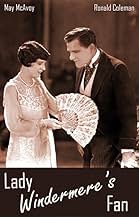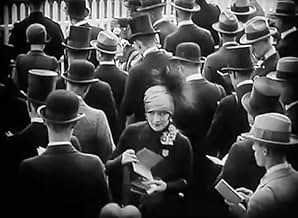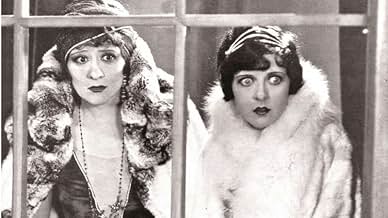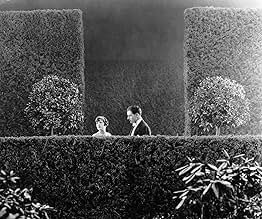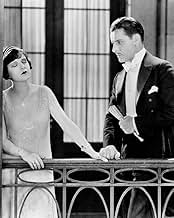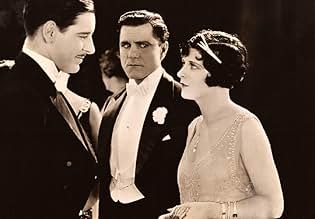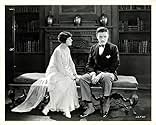IMDb RATING
7.2/10
1.5K
YOUR RATING
A society woman believes her husband is having an affair, a misconception which may have dire personal consequences for all involved.A society woman believes her husband is having an affair, a misconception which may have dire personal consequences for all involved.A society woman believes her husband is having an affair, a misconception which may have dire personal consequences for all involved.
- Awards
- 1 win total
Edward Martindel
- Lord Augustus Lorton
- (as Edw. Martindel)
Carrie Daumery
- The Duchess of Berwick
- (as Mme. Daumery)
Billie Bennett
- Lady Plymdale
- (uncredited)
Michael Dark
- Party Guest
- (uncredited)
Helen Dunbar
- Mrs. Cowper-Cowper
- (uncredited)
Frank Finch Smiles
- Waiter with Party Guest List
- (uncredited)
Larry Steers
- Party Guest
- (uncredited)
Ellinor Vanderveer
- Party Guest
- (uncredited)
Percy Williams
- Waiter at the Party
- (uncredited)
Featured reviews
In "Lady Windermere's Fan" the great Ernst Lubitsch may have bitten off a bit more than he can chew. First and foremost, how can you reproduce Oscar Wilde's witty dialogue in a SILENT FILM?? True, the famous 'Lubitsch touch' is apparent, but minus Wilde it becomes a romantic drama.
The players are excellent and above reproach, in particular Irene Rich as Mrs. Erlynne - in fact, it is basically her picture. A youthful Ronald Colman as Lord Darlington underplays his role but is urbane and charming (in truth, I have not read or seen the play before but that is my perception). I have always liked Colman in everything I have seen him in, but, of course, you can't hear his marvelous voice and diction here.
Despite these drawbacks I enjoyed the film and felt the photography was exceptionally good. I just felt it would have been even better with a soundtrack, as it lacks the requisite bite and panache.
Sadly, a drawing room comedy of manners such as "Lady Windermere's Fan" wouldn't work today, as modern day audiences would be baffled by the subtlety and lack of action. That may be why it hasn't been remade successfully in the sound era. I give it a rating of 7.
The players are excellent and above reproach, in particular Irene Rich as Mrs. Erlynne - in fact, it is basically her picture. A youthful Ronald Colman as Lord Darlington underplays his role but is urbane and charming (in truth, I have not read or seen the play before but that is my perception). I have always liked Colman in everything I have seen him in, but, of course, you can't hear his marvelous voice and diction here.
Despite these drawbacks I enjoyed the film and felt the photography was exceptionally good. I just felt it would have been even better with a soundtrack, as it lacks the requisite bite and panache.
Sadly, a drawing room comedy of manners such as "Lady Windermere's Fan" wouldn't work today, as modern day audiences would be baffled by the subtlety and lack of action. That may be why it hasn't been remade successfully in the sound era. I give it a rating of 7.
When a stage play is turned into a movie the results can be dire, especially when the play is a dialog-driven comedy of manners, full of quips and epigrams. Unless it's handled carefully even a great play might come off as 'canned' and lifeless on screen, amounting to little more than what Alfred Hitchcock dismissed as "photographs of people talking." A few exceptions come to mind: The Philadelphia Story, the two versions of Holiday made in the '30s, the Rex Harrison/Margaret Rutherford Blithe Spirit, and a handful of other stage-to-screen adaptations that manage to be lively and entertaining despite heavy reliance on dialog. But these films are surpassed in achievement, in one sense at least, by an adaptation from 1925 which perfectly captures the spirit of the play it presents while scarcely quoting it!
Before seeing Ernst Lubitsch's silent version of Lady Windermere's Fan at the Museum of Modern Art this summer I re-read Oscar Wilde's play, which I enjoyed, but I didn't have high hopes for the movie, despite the involvement of a director I count among my favorites. I imagined the movie would consist of actors standing around in tuxes and evening gowns pretending to mouth witty sayings, which would then be presented to us in numerous title cards; but because I admire Lubitsch's sound films a great deal I thought I'd give it a try. Plus, I thought it'd be interesting to see Ronald Colman in a silent film, deprived of that wonderful voice. What a pleasant surprise to find that this is one of the best sophisticated comedies of the silent screen. The flavor of Wilde's play is distilled to its essence, and clearly conveyed without relying on a single one of his famous epigrams. (Interestingly, a recent biography of Lubitsch says that the film quotes only two or three lines from the play, but if so I didn't catch them.) How is this possible?
Lubitsch conveys Wilde's notions about high society swells and their prejudices cinematically, not verbally. When the notorious Mrs. Erlynne (Irene Rich) appears at the Ascot race track, the reaction of "society" is quickly made clear to us by the scandalized facial expressions of the ladies present; who, nonetheless, can't stop looking at her or talking about her. The tone of their remarks is obvious from their sour expressions. Naturally, the men are interested in Mrs. Erlynne, too. She is shown, montage fashion, from many different angles, through lorgnettes and binoculars, long-shot, extreme long-shot and close-up, and while the horse race is reduced to mere background. It's a funny and informative sequence, yet it isn't in Wilde's play at all. In another scene that more closely follows the text, Lord Darlington (Colman) calls on Lord and Lady Windermere at their home. He is formally announced, and pretends briefly that he actually came to see Lord Windermere on some minor matter. But when Windermere conveniently leaves on business, Darlington, shown in a stately long-shot, strides away from Lady Windermere (May McAvoy), sits, shoots her a sly look, and announces that he is in love with her. Shocked, she crosses and drops into a chair next to him. He rises, crosses away from her, and drops into a different chair. They both look miserable. Fade-out. It's a beautifully staged scene, and no additional dialog is necessary.
Another sequence that occurs late in the film perfectly epitomizes the famous Lubitsch Touch while deftly conveying the spirit of Wilde's play: a title card announces that "The relations between a man and a woman can be told by the way he presses her doorbell." Various ways in which this is so are then demonstrated. You wouldn't think that a close-up shot of a doorbell and a gentleman's gloved hand could be so suggestive, but Lubitsch manages to suggest a great deal.
The black & white cinematography of Lady Windermere's Fan positively shimmers; happily, this is one silent film that has been well preserved. The acting is quite restrained by the standards of the day, and even without his voice Ronald Colman has the presence of a star, while Irene Rich gives the performance of her career. It's a wonderful adaptation of a great play that can stand on its own as cinema; and it may come as a surprise to those who believe silent film comedy begins and ends with Ben Turpin and the Keystone Cops.
Before seeing Ernst Lubitsch's silent version of Lady Windermere's Fan at the Museum of Modern Art this summer I re-read Oscar Wilde's play, which I enjoyed, but I didn't have high hopes for the movie, despite the involvement of a director I count among my favorites. I imagined the movie would consist of actors standing around in tuxes and evening gowns pretending to mouth witty sayings, which would then be presented to us in numerous title cards; but because I admire Lubitsch's sound films a great deal I thought I'd give it a try. Plus, I thought it'd be interesting to see Ronald Colman in a silent film, deprived of that wonderful voice. What a pleasant surprise to find that this is one of the best sophisticated comedies of the silent screen. The flavor of Wilde's play is distilled to its essence, and clearly conveyed without relying on a single one of his famous epigrams. (Interestingly, a recent biography of Lubitsch says that the film quotes only two or three lines from the play, but if so I didn't catch them.) How is this possible?
Lubitsch conveys Wilde's notions about high society swells and their prejudices cinematically, not verbally. When the notorious Mrs. Erlynne (Irene Rich) appears at the Ascot race track, the reaction of "society" is quickly made clear to us by the scandalized facial expressions of the ladies present; who, nonetheless, can't stop looking at her or talking about her. The tone of their remarks is obvious from their sour expressions. Naturally, the men are interested in Mrs. Erlynne, too. She is shown, montage fashion, from many different angles, through lorgnettes and binoculars, long-shot, extreme long-shot and close-up, and while the horse race is reduced to mere background. It's a funny and informative sequence, yet it isn't in Wilde's play at all. In another scene that more closely follows the text, Lord Darlington (Colman) calls on Lord and Lady Windermere at their home. He is formally announced, and pretends briefly that he actually came to see Lord Windermere on some minor matter. But when Windermere conveniently leaves on business, Darlington, shown in a stately long-shot, strides away from Lady Windermere (May McAvoy), sits, shoots her a sly look, and announces that he is in love with her. Shocked, she crosses and drops into a chair next to him. He rises, crosses away from her, and drops into a different chair. They both look miserable. Fade-out. It's a beautifully staged scene, and no additional dialog is necessary.
Another sequence that occurs late in the film perfectly epitomizes the famous Lubitsch Touch while deftly conveying the spirit of Wilde's play: a title card announces that "The relations between a man and a woman can be told by the way he presses her doorbell." Various ways in which this is so are then demonstrated. You wouldn't think that a close-up shot of a doorbell and a gentleman's gloved hand could be so suggestive, but Lubitsch manages to suggest a great deal.
The black & white cinematography of Lady Windermere's Fan positively shimmers; happily, this is one silent film that has been well preserved. The acting is quite restrained by the standards of the day, and even without his voice Ronald Colman has the presence of a star, while Irene Rich gives the performance of her career. It's a wonderful adaptation of a great play that can stand on its own as cinema; and it may come as a surprise to those who believe silent film comedy begins and ends with Ben Turpin and the Keystone Cops.
I agree with the other reviewers that Lubitsch did a great job reworking parts of Wilde's play to make it suitable for silent film, and adding some of his signature touches. But I don't think the movie stands up to some of his later pieces, such as "Trouble in Paradise" and "Design for Living" (also reworked from a famous play, to good advantage). "Lady Windermere's Fan" is much more slow-paced, which can make it hard for a modern viewer, and not all of the characters are as interesting. However, the performances are good, especially the marvelous Irene Rich (whose high-fashion costumes are endlessly entertaining), the production values are high, and if you have the patience, you will be rewarded with some nice little bits of Lubitsch's social observation. It's interesting to consider how drastically attitudes toward male-female relations have changed over the decades: the film's plot depends on beliefs that have mostly, and rightfully, vanished. In contrast to convention, Lubitsch obviously enjoyed helping Rich create an older woman who was fascinating and sexually powerful.
An epigram-less silent screen version of Oscar Wilde by Ernst Lubitsch is likely to be a contest rather than a collaboration (and not surprisingly Lubitsch wins).
Irene Rich's handsome profile in the role of Mrs Erlynne provides a sight to savour throughout, and the race meet at which we see her from constantly switching viewpoints as people study her through their binoculars is one of the visual & cinematic highlights of the film.
Irene Rich's handsome profile in the role of Mrs Erlynne provides a sight to savour throughout, and the race meet at which we see her from constantly switching viewpoints as people study her through their binoculars is one of the visual & cinematic highlights of the film.
Nobody was as savvy about the intricacies of the human heart as Lubitsch, and of how virtue is never an absolute.
This warmly empathetic, highly sophisticated gem is an adaptation of Oscar Wilde, with virtually none of the play's dialog utilized, but as suggestive and outrageous as Wilde himself, conceived, framed and edited as pure cinema.
From the exact same period as Cecil B. DeMille's infinitely more crass sex comedies and Charles Chaplin's equally brilliant and morally ambiguous 'The Woman of Paris', but carried by an indistinguishably European sensibility. Irene Rich as the woman who sacrifices herself in secret is impossibly glamorous and subtle, May McAvoy is truly heartbreaking as the socialite suspicious of her husband's philandering, but Ronald Colman, alas, is left with nothing much to do except smolder sexily at the fringes with those impertinently raised eyebrows.
A highlight is the Ascot game, a marvel of choreography and mime, a delicious baiting of upper class hypocrisy.
This warmly empathetic, highly sophisticated gem is an adaptation of Oscar Wilde, with virtually none of the play's dialog utilized, but as suggestive and outrageous as Wilde himself, conceived, framed and edited as pure cinema.
From the exact same period as Cecil B. DeMille's infinitely more crass sex comedies and Charles Chaplin's equally brilliant and morally ambiguous 'The Woman of Paris', but carried by an indistinguishably European sensibility. Irene Rich as the woman who sacrifices herself in secret is impossibly glamorous and subtle, May McAvoy is truly heartbreaking as the socialite suspicious of her husband's philandering, but Ronald Colman, alas, is left with nothing much to do except smolder sexily at the fringes with those impertinently raised eyebrows.
A highlight is the Ascot game, a marvel of choreography and mime, a delicious baiting of upper class hypocrisy.
Did you know
- TriviaOne of the 50 films in the three-disk boxed DVD set called "More Treasures from American Film Archives, 1894-1931" (2004), compiled by the National Film Preservation Foundation from five American film archives. This film is preserved by the Museum of Modern Art, has a running time of 89 minutes and an added piano music score.
- Quotes
Opening title card: Lady Windermere faced the grave problem of seating her dinner guests.
- ConnectionsFeatured in Historia del cine: Epoca muda (1983)
- How long is Lady Windermere's Fan?Powered by Alexa
Details
- Release date
- Country of origin
- Language
- Also known as
- Lady Windermere's Fan
- Filming locations
- Toronto, Ontario, Canada(Racetrack Scene)
- Production company
- See more company credits at IMDbPro
Box office
- Budget
- $320,000 (estimated)
- Runtime
- 2h(120 min)
- Sound mix
- Aspect ratio
- 1.33 : 1
Contribute to this page
Suggest an edit or add missing content

